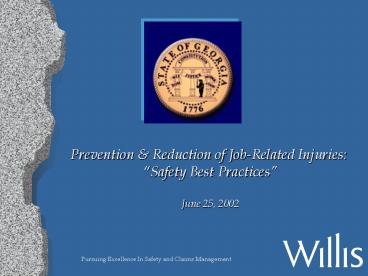Prevention - PowerPoint PPT Presentation
1 / 17
Title:
Prevention
Description:
Use of Safety Equipment. Awareness. Fitness. Appropriate Job Parameters. Hazard Identification ... Protect equipment and property from loss. Establish ... – PowerPoint PPT presentation
Number of Views:33
Avg rating:3.0/5.0
Title: Prevention
1
Prevention Reduction of Job-Related Injuries
Safety Best Practices June 25, 2002
2
Key State of GA Work-Related Injury Statistics
- 145,104 State Employees
- Number of 2001-02 Injuries 9,143
- Total Cost of Injuries 46,554,669
- Estimated Total Cost to the State when Indirect
Costs of Injuries Added 139,664,007 - Workdays Lost due to Injuries 29,064, or 112
years of Worker Productivity
3
Major Drivers of State Injuries
- Most Frequent Types of Injuries
- Struck By Object 2,318 Injuries
- Slip Fall 2,208 Injuries
- Twisting, Lifting or Reaching 1,605 Injuries
- Cut, Puncture or Scrape 581 Injuries
4
Major Drivers of State Injuries, continued
- Most Costly Types of Injuries
- Slips Falls
- Twisting, Lifting or Reaching
- Struck By Object
- Motor Vehicle Accidents
5
Best Practices Slips Falls
- Hazard Identification Treatment
- Housekeeping
- Clearly Marked Hazards
- Proper Lighting
- Exercising Care while Working
- Formal Guidelines for Tasks Performed at Heights
- Tie-Off When Necessary
- Proper Safety Equipment
- Awareness
6
Best Practices Twisting, Lifting or Reaching
- Training
- Use of Safety Equipment
- Awareness
- Fitness
- Appropriate Job Parameters
- Hazard Identification
- Stacking Storage Guidelines
7
Best Practices Struck By Object
- Training and Orientation
- Hazard Identification
- Use of Safety Equipment PPE
- Equipment Guarding
- Awareness
- Maintenance of Equipment
- Accident Investigation Response
- Stacking Storage Guidelines
8
Best Practices Vehicle Accidents
- Driver Selection
- Training and Orientation
- Defensive Driving
- Awareness
- Maintenance of Vehicles
- Accountability
- Accident Investigation Follow-Up
- Notify Risk Management via the 1(888)Number
9
Objectives
- Protect employees and others from injury
- Protect equipment and property from loss
- Establish performance standards
- Assure regulatory compliance
- Provide basis for affirmative defense in the
- event of litigation
- Enhance Image of State
10
Key Elements of Successful Safety Management
- Management involvement
- Establishment of responsibility and
accountability - Development of safety action plans for each
department and agency - Detailed record keeping and performance -
measurement system - Substance abuse screening
- New employee orientation
- Qualification to perform high hazard activities
- Achieve employee commitment to Buy-In
- Develop a employee self-assessment program
Continue Coaching . . .
(Pre-Loss)
11
Key Elements of Successful Safety Management
- Medical case management
- Claims review - scheduled frequent
- Selection of physician
- Accident re-construction engineering
- firms are available
- Broker Risk Control guidance
- Competent staff
Communication . . . Communication
(Post Loss)
12
Top Management must feel pain and dissatisfaction
with past performance and must have the courage
to change. They must break out of line, even to
the point of exile amongst their peers. There
must be a burning desire to transform their style
of management. W. Edwards Deming
13
What Do You Gain?
14
Management Needs to Believe . . .
- Accidents are intolerable - there are no
excuses! - Safety isnt Safety - Its Management
Effectiveness - Responsibilities and expectations - clearly
defined - Communications - informal, open, encouraged
- Efforts closely measured and responded to
15
Some men see thing as they are and say, WHY
I dream things that never were, and say, WHY
NOT?
16
Safety Culture
- Safety becomes a way of life
- The process becomes achievable
- Total (good) management paramount
- There are few accidents (if any)
There is simply Excellent Management
17
End Results
- Improved Productivity
- Improved Morale
- Less Suffering
- Reduced Cost































